新概念第一册第5课
- 格式:ppt
- 大小:6.99 MB
- 文档页数:59
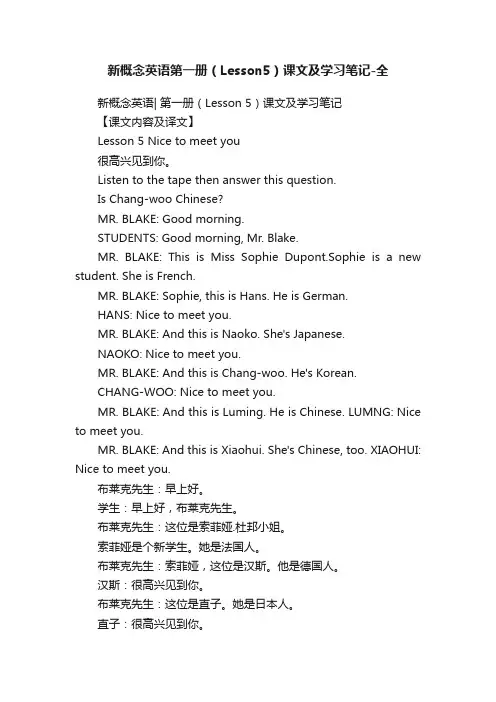
新概念英语第一册(Lesson5)课文及学习笔记-全新概念英语| 第一册(Lesson 5)课文及学习笔记【课文内容及译文】Lesson 5 Nice to meet you很高兴见到你。
Listen to the tape then answer this question.Is Chang-woo Chinese?MR. BLAKE: Good morning.STUDENTS: Good morning, Mr. Blake.MR. BLAKE: This is Miss Sophie Dupont.Sophie is a new student. She is French.MR. BLAKE: Sophie, this is Hans. He is German.HANS: Nice to meet you.MR. BLAKE: And this is Naoko. She's Japanese.NAOKO: Nice to meet you.MR. BLAKE: And this is Chang-woo. He's Korean.CHANG-WOO: Nice to meet you.MR. BLAKE: And this is Luming. He is Chinese. LUMNG: Nice to meet you.MR. BLAKE: And this is Xiaohui. She's Chinese, too. XIAOHUI: Nice to meet you.布莱克先生:早上好。
学生:早上好,布莱克先生。
布莱克先生:这位是索菲娅.杜邦小姐。
索菲娅是个新学生。
她是法国人。
布莱克先生:索菲娅,这位是汉斯。
他是德国人。
汉斯:很高兴见到你。
布莱克先生:这位是直子。
她是日本人。
直子:很高兴见到你。
布莱克先生:这位是昌宇。
他是韩国人。
昌宇:很高兴见到你。
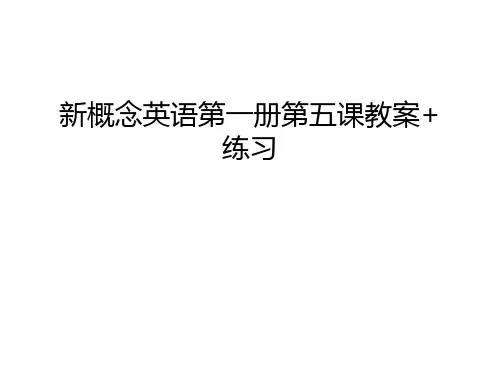

新概念第一册5课笔记1. Mr. 先生/老师(用于男士的姓之前)Mr. Yang 杨老师Mr. Blake 布莱克先生Miss 小姐(对未婚女士或婚姻情况不明的女士的称呼)Mrs. 夫人(对已婚女士称呼)2. Good morning. 早上好。
Good afternoon. 下午好。
Good evening. 晚上好。
Good night. 晚安以上问候语,是相互问候的。
当别人用这些问候语问候你时,我们用同样的回答问候对方。
A. Good morning.B:Good morning.3. Nice to meet you. 用于第一次见面时的用语。
回答:Nice to meet you, too.正式场合,初次见面用How do you do? 回答也是How do you do?4. too 也用于句末,且要与前面句子用逗号隔开。
He is Chinese.I am Chinese, too.5. What make is it? 它是什么牌子的?It is a Mercedes.6. a/an 一个a 放在辅音因素开始的单词前面 ab ook a d eskan 放在元音开头的单词前面an e gg an e lephant7. or 还是,或者Is she a Swedish student or a French student?8. 本课学生容易出错的地方I am Chinese.表示国人时,前面通常不加冠词a或者anHe is German. (正确)He is a German. (错误,German前不能加a)翻译成“某国的…”时,通常前面是要加a或anIt is an American car.9. 本课还要熟悉人称代词he she it 的用法:他们都是主格形式,在句子中做主语,通常放在动词前面10. 本课要给学生介绍特殊疑问句,即:特殊疑问词+ 一般疑问句特殊疑问词有:who, what, when, which, why, where, whose, how等What is your name?。
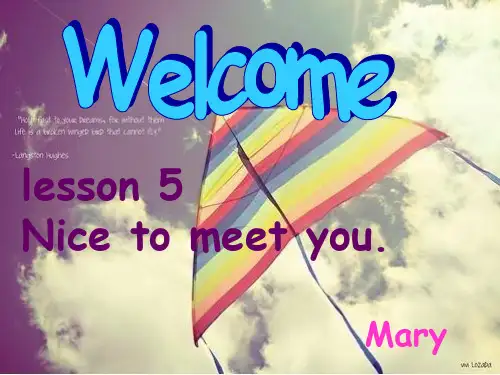
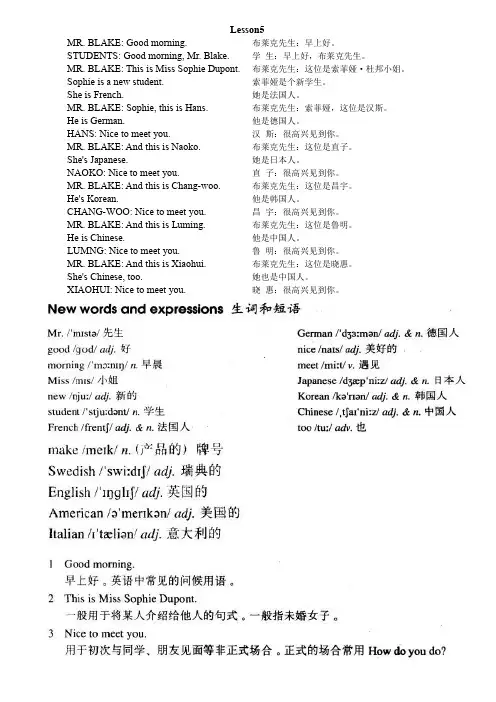
Lesson5MR. BLAKE: Good morning.STUDENTS: Good morning, Mr. Blake. MR. BLAKE: This is Miss Sophie Dupont. Sophie is a new student. She is French.MR. BLAKE: Sophie, this is Hans. He is German.HANS: Nice to meet you.MR. BLAKE: And this is Naoko. She's Japanese.NAOKO: Nice to meet you.MR. BLAKE: And this is Chang-woo. He's Korean.CHANG-WOO: Nice to meet you. MR. BLAKE: And this is Luming. He is Chinese.LUMNG: Nice to meet you.MR. BLAKE: And this is Xiaohui.She's Chinese, too.XIAOHUI: Nice to meet you.布莱克先生:早上好。
学 生:早上好,布莱克先生。
布莱克先生:这位是索菲娅·杜邦小姐。
索菲娅是个新学生。
她是法国人。
布莱克先生:索菲娅,这位是汉斯。
他是德国人。
汉 斯:很高兴见到你。
布莱克先生:这位是直子。
她是日本人。
直 子:很高兴见到你。
布莱克先生:这位是昌宇。
他是韩国人。
昌 宇:很高兴见到你。
布莱克先生:这位是鲁明。
他是中国人。
鲁 明:很高兴见到你。
布莱克先生:这位是晓惠。
她也是中国人。
晓 惠:很高兴见到你。
【知识点讲解】1. 今天我们会学习到很多打招呼的方法,这在实际交往中很有用哦!1)Good morning. 早上好。
2) Good afternoon. 下午好。
![[全]新概念英语(第1册5课)](https://uimg.taocdn.com/20784edca300a6c30c229fd5.webp)
新概念英语(第1册5课)新概念英语第一册Lesson 5 New words & expressions1. Mr. ['mistə] 先生2. good [gud] a.好3. morning ['mɔ:niŋ] n.早晨4. Miss [mis] 小姐5. new [nju:] a.新的6. student ['stju:dənt] n.学生7. French [frentʃ] a.& n.法国人8. German ['dʒə:mən] a.& n.德国人9. nice ['nais] a.美好的10. meet [mi:t] v.遇见11. Japanese [ˌdʒæpə'ni:z] a.& n.日本人12. Korean [kə'riən] a.& n.韩国人13. Chinese [ˌtʃai'ni:z] a.& n.中国人14. too [tu:] ad.也1. Mr. ['mistə] 先生Mr,a title used before the family name or full name of a man who has no other title, orwhen talking to a man who holds a particularofficial position(用在男子的姓、姓名或职务之前)先生Mr Jones/Mr Wang/Mr David Jones 琼斯先生/王先生/戴维琼斯先生Good afternoon, Mr Dawson.下午好,道森先生。
We're looking for a Mr (= a man called) George Smith.我们在找一位名叫乔治史密斯的先生。
It's an honour to have you here today, Mr President.很荣幸您今天能来,总统先生。
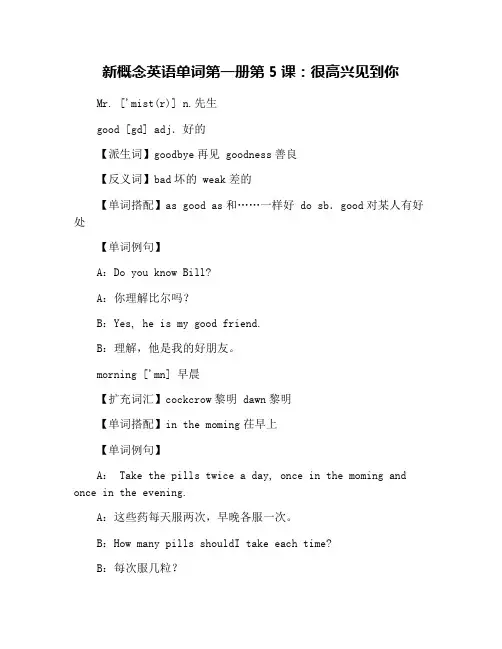
新概念英语单词第一册第5课:很高兴见到你Mr. ['mist(r)] n.先生good [gd] adj.好的【派生词】goodbye再见 goodness善良【反义词】bad坏的 weak差的【单词搭配】as good as和……一样好 do sb.good对某人有好处【单词例句】A:Do you know Bill?A:你理解比尔吗?B:Yes, he is my good friend.B:理解,他是我的好朋友。
morning ['mn] 早晨【扩充词汇】cockcrow黎明 dawn黎明【单词搭配】in the moming茌早上【单词例句】A: Take the pills twice a day, once in the moming and once in the evening.A:这些药每天服两次,早晚各服一次。
B:How many pills shouldI take each time?B:每次服几粒?Miss[mis] 小姐【单词例句】A: Karl, have you met my colleague, Miss Li?A:卡尔,你见过我的同事李小姐了吗?B: No,I haven't had the pleasure yet.B:没有,我至今还没有这个荣幸。
new [nju]adj.【派生词】news新闻,新的 newcomer新来者【义词】old老的,旧的【单词搭配】new coat新衣服 New York纽约【单词例句】A: CanI borrow your new bicycle, John?A:约翰,我能借你的新自行车用一下吗?B:Sure,here is the key.B:当然能够,给你钥匙。
student ['stjud()nt]学生【单词扩充】pupil小学生 undergraduate大学生【单词搭配】student union学生会【单词例句】A: How many students are there in your classroom? A:你们班上有多少学生?B: There are more than sixtyB:有六十多个。
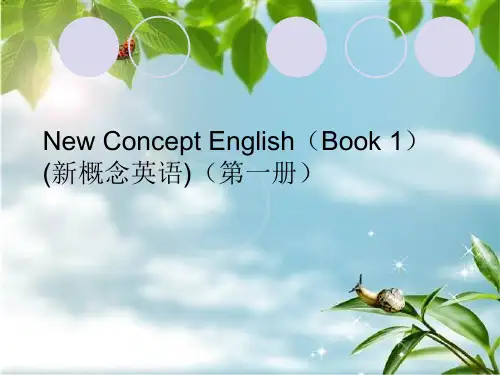
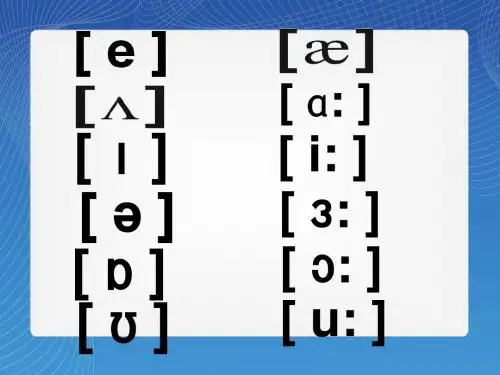
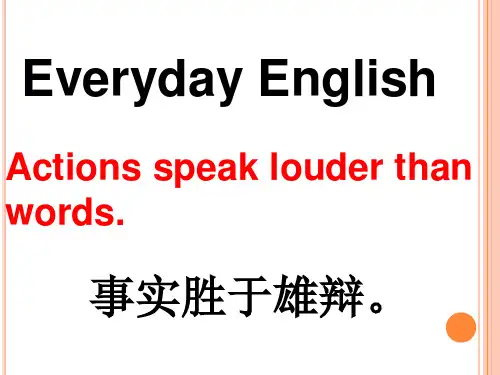

新概念第一册词汇语法第5课:Nice to Meet You很高兴见到你Lesson 5 Nice to meet you很高兴见到你Good morning.Good morning, Mr. Blake.This is Miss Sophie Dupont.Sophie is a new student.She is French.Sophie, this is Hans.He is German.Nice to meet you.And this is Naoko.She's Japanese.Nice to meet you.And this is Chang-woo.He's Korean.Nice to meet you.And this is Luming.He is Chinese.Nice to meet you.And this is Xiaohui.She's Chinese, too.Nice to meet you.布莱克先生:早上好。
学生:早上好,布莱克先生。
布莱克先生:这位是索菲娅.杜邦小姐。
索菲娅是个新学生。
她是法国人。
布莱克先生:索菲娅,这位是汉斯。
他是德国人。
汉斯:很高兴见到你。
布莱克先生:这位是直子。
她是日本人。
直子:很高兴见到你。
布莱克先生:这位是昌宇。
他是韩国人。
昌宇:很高兴见到你。
布莱克先生:这位是鲁明。
他是中国人。
鲁明:很高兴见到你。
布莱克先生:这位是晓惠。
她也是中国人。
晓惠:很高兴见到你。
【生词】Mr. 先生good adj. 好Miss 小姐new adj. 新的student n. 学生French adj. & n. 法国的,法国人German adj. & n. 德国的,德国人nice adj. 美好的meet v. 遇见Japanese adj. & n. 日本的,日本人Korean adj. & n. 韩国的,韩国人Chinese adj. & n. 中国的,中国人too adv. 也1. 今天我们会学习到很多打招呼的方法,这在实际交往中很有用哦!1)Good morning. 早上好。
新概念英语| 第一册(Lesson 5)课文及学习笔记【课文内容及译文】Lesson 5 Nice to meet you很高兴见到你。
Listen to the tape then answer this question.Is Chang-woo Chinese?MR. BLAKE: Good morning.STUDENTS: Good morning, Mr. Blake.MR. BLAKE: This is Miss Sophie Dupont.Sophie is a new student. She is French.MR. BLAKE: Sophie, this is Hans. He is German.HANS: Nice to meet you.MR. BLAKE: And this is Naoko. She's Japanese.NAOKO: Nice to meet you.MR. BLAKE: And this is Chang-woo. He's Korean.CHANG-WOO: Nice to meet you.MR. BLAKE: And this is Luming. He is Chinese. LUMNG: Nice to meet you.MR. BLAKE: And this is Xiaohui. She's Chinese, too. XIAOHUI: Nice to meet you.布莱克先生:早上好。
学生:早上好,布莱克先生。
布莱克先生:这位是索菲娅.杜邦小姐。
索菲娅是个新学生。
她是法国人。
布莱克先生:索菲娅,这位是汉斯。
他是德国人。
汉斯:很高兴见到你。
布莱克先生:这位是直子。
她是日本人。
直子:很高兴见到你。
布莱克先生:这位是昌宇。
他是韩国人。
昌宇:很高兴见到你。
布莱克先生:这位是鲁明。
他是中国人。
鲁明:很高兴见到你。